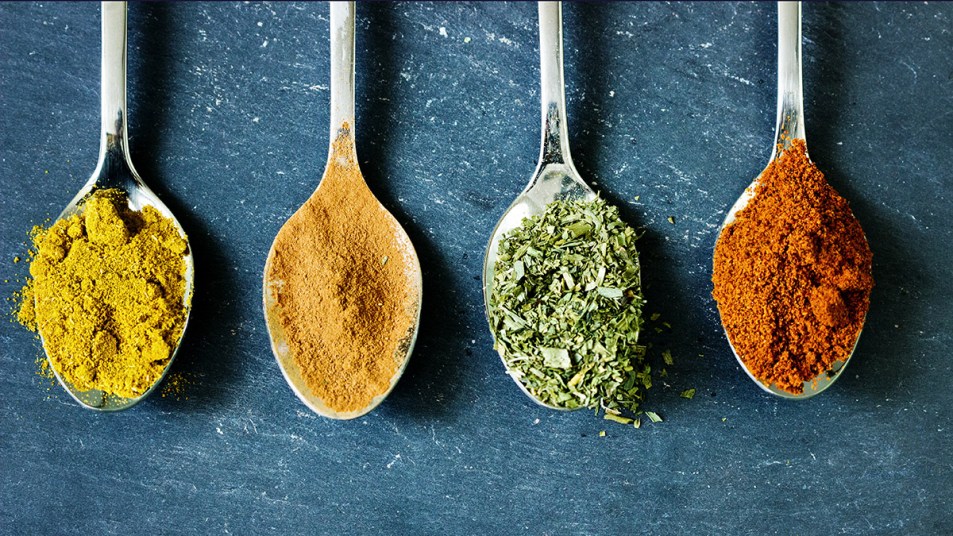Spice Brands Without Heavy Metals: Here’s What a Top MD Recommends
One brand that came out on top: Walmart's Great Value store brand. Read on to discover more

Dried herbs and spices are incredible additions to your food, both in terms of taste and health benefits. So when a consumer organization tested dried herbs and spices from 38 brands and revealed that some of them contained “worrisome” quantities of heavy metals like arsenic, lead and cadmium, it had us wondering if we should skip spices all together — or if there are any spice brands without heavy metals.
In the investigation, conducted by Consumer Reports, researchers examined 15 dried herbs and spices: basil, black pepper, chili powder, coriander, cumin, curry powder, garlic powder, ginger, oregano, paprika, saffron, sesame seed, thyme, turmeric and white pepper. They selected 126 products manufactured by corporations big and small, both from the United States and other parts of the world. And although the headlines raised alarm, only five of the 126 products tested had amounts of heavy metals that were of “moderate concern” or “high concern.” These products were in the basil, oregano, thyme and turmeric categories.
How heavy metals harm health
Heavy metals get their name from their high atomic weights or their grouping on the Periodic Table chart that hung in your high school science class. Heavy metals can be the byproducts of industries like mining, manufacturing and farming. Those metals often end up getting polluted back into our air, water, soil and wildlife. For example, people who eat a lot of tuna fish run the risk of having mercury in their system.
Even though we know to avoid heavy metals, these dangerous compounds have a way of finding us. Once in the environment, they can sneak into our bodies undetected in trace amounts. The metals can bind to parts of your cells that prevent your organs from doing their job; and the resulting symptoms like fatigue, anxiety, depression, memory loss, and difficulty concentrating. Long-term exposure to heavy metals can lead to gradually progressing physical, muscular, and neurological degenerative processes that imitate diseases such as multiple sclerosis, Parkinson’s disease, Alzheimer’s disease and muscular dystrophy.
And top health expert Mark Hyman, MD, senior advisor at the Cleveland Clinic Center for Functional Medicine, asserts, “Low-level heavy metal toxicity is one of the most common and undiagnosed causes of a whole host of diseases.” Indeed, Dr. Hyman, the 15-time New York Times bestselling wellness author, reveals he also suffered from mercury poisoning. “I felt weak, tired and couldn’t think,” he recalls of his past illness. (Click through to learn more about one woman’s struggle to overcome heavy metal toxicity despite being shrugged off by doctors.)
Why you should still fill up on spices
But the benefits of consuming these spices and herbs are too important to overall health to discontinue their use, says Melina Jampolis, MD, a board-certified physician nutrition specialist and chief medical officer at Ahara, a personalized nutrition app. “I do not recommend that you cut back on herbs and spices,” she says. “In fact, I want you to increase your use, because we know they have head-to-toe benefits — from decreasing risk of heart disease, Alzheimer’s, diabetes and cancer and helping improve gut health, to name a few.
How heavy metals get into herbs and spices
Most soil contains trace amounts of heavy metals; some are naturally occurring, while others come from fertilizers, pesticides, industry and environmental pollution. These toxins are absorbed by plants as they grow. Says Dr. Jampolis, author of Spice Up, Slim Down: A guide to using herbs and spices to live a longer, healthier and more vibrant life: “The nature of environmental contamination makes it almost impossible to completely avoid any toxins, even in foods that are organic.”
And while parents do need to be concerned about infant rice cereal contaminated with lead and arsenic, when it comes to herbs and spices, the risk suggested by the Consumer Reports study is somewhat overblown, Dr. Jampolis adds. “Vulnerable populations [infants, the elderly and people with serious chronic health issues] may be more at risk from these contaminants, but for the average person between the ages of 18 and 80 who is consuming a normal diet, you don’t really need to be concerned.”
The products with high levels of heavy metals in the study were mostly herbs. Dr. Jampolis says that’s likely because “the leaves are most directly fed by the soil, and we eat the whole leaf.” But she’s also quick to point out that even among the herbs that were called out, most of the products tested in those herb groups fell into the lowest contamination levels of “no concern” or “some concern.”
Spice brands without heavy metals
In the Consumer Reports test of the 126 spices for heavy metals, all of the products tested made by McCormick, Spice Islands, Simply Organic, Great Value (Walmart’s store brand) and Morton & Bassett had the lowest levels of heavy metals, falling into the study’s “no concern” or “some concern” categories. “It’s not necessary to spend a fortune on fancy spices,” says Dr. Jampolis. When it comes to basil, oregano, thyme and turmeric, it’s a smart idea to go with one of those five brands.
Another reason to replace the herbs and spices in your pantry is if they’re old. Dr. Jampolis advises tossing any spices that are more than two years old and doing the same with herbs that are older than one year. “The polyphenols, which are what bring so many of the health benefits, degrade over time and when they’re exposed to light,” she says. “You may still get flavor, but you won’t get the benefit, and maximizing these disease-fighting polyphenols offsets any theoretical harm from very small amounts of contaminants.” (Click through to learn how to tell when spices have gone bad.)
Other ways to reduce toxin exposure from herbs and spices
- Use blends. Says Dr. Jampolis: “Using an Italian herb blend means you’re diluting everything. So you’re getting a mixture of smaller amounts of thyme, oregano and basil.” (Check this easy recipe on our sister site to make your own blend of Texas Roadhouse Steak Seasoning.)
- Use a variety of herbs and spices. By using lots of flavors and not focusing heavily on one, you’re reducing any risk, no matter how small, of getting too much of it, she says.
- Grow your own, especially if you’re a heavy user of basil, oregano or thyme. Doing so reduces the risk of soil and water contamination, says Dr. Jampolis. (Click through to learn how to grow your own rosemary from cuttings.) “Basil, in particular, is super easy to grow and use in your kitchen. You could even get an herb drier and dry your own.”
“Eating spices and herbs is so beneficial for your health,” says Dr. Jampolis. “Most of my patients don’t eat enough, and it’s such a low-hanging fruit that’s so easy to take advantage of. Just add spices and herbs and you immediately improve the health value of any dish exponentially — and more than likely will decrease your risk of many of the diseases of aging.” (Click through to discover the heavy metal detox smoothie that’s changing lives!)
For more must-know info on herbs and spices, keep reading!
Wait! Read This Before You Toss Out Those Cilantro Stems — It’ll Save You Money
This Clever Method For Drying Fresh Herbs Saves Money and Prevents Waste
From Elevating Recipes To Curing Springtime Sniffles — These 20 Herbs Serve Many Purposes
This content is not a substitute for professional medical advice or diagnosis. Always consult your physician before pursuing any treatment plan.













